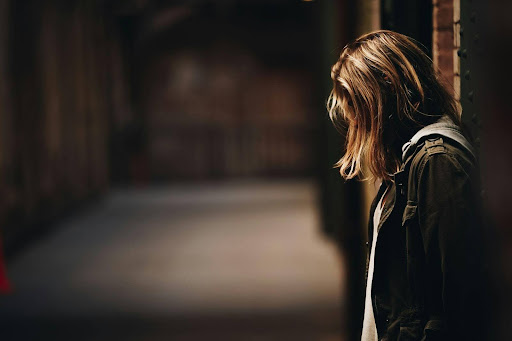We talked with 50 teenage girls and young women from communities with high rates of HIV, early pregnancy and school drop-out rates to hear what’s stressing them out — and how they are keeping it together. (Eric Ward/Unsplash)
Think of a young woman’s world like a series of circles, each one influencing the next.
At the centre is the girl herself — her thoughts, feelings and personal struggles. Around her are her relationships with family and friends, and with school and the community. And then there’s the bigger picture — a society fraught with inequality and impossible expectations.
Our team of researchers used this framework to make sense of the ways those circles of influence affect the mental health of South Africa’s teen girls and young women.
The data is limited, but what we do know shows numbers that are staggering. A 2022 study of learners in the Western Cape found that one in three were experiencing symptoms of depression, while research in Mpumalanga showed that just over a quarter did — with girls far more likely to be depressed than boys of the same age.
Our earlier work highlighted what we called a sexual and reproductive mental health syndemic — a messy mix of overlapping sexual and reproductive health risks and emotional struggles. When girls feel isolated, unsupported and under constant pressure, it often leads to taking bigger risks, such as having sex with the wrong people for the wrong reasons, or not using a condom, heightening their chances of contracting HIV and other sexually transmitted infections, falling pregnant without planning for it, and mental health problems.
Several studies have looked at the social, economic, environmental, physiological and interpersonal factors that play a part in mental health struggles among young people in South Africa. But there has been scant focus on how young women themselves see the different issues influencing their mental health and well-being.
We sat down with over 50 young women between the ages of 15 and 24 from two communities — one in KwaZulu-Natal and the other in North West — with high rates of HIV, early pregnancy and school drop-outs. What they shared with us showed how stress doesn’t just come from one place — it strikes from every angle. But they also told us how, despite the challenges they face, they somehow manage to keep it together.
I break down four things that influence their mental health and five ways to cope.
Four things that hurt young women’s mental health
- Individual-level struggles: Girls described low self-esteem, academic pressures and discrimination related to being gay, lesbian or bisexual as daily worries, fuelling bad coping strategies, like substance use. Early pregnancies made many feel future opportunities had slipped away.
As one young woman put it, “We blame and judge ourselves even before other people can blame us,” capturing the internalisation of shame and guilt that heightens isolation.
- Interpersonal problems: A striking number felt emotionally isolated, citing a lack of trusted people to confide in. Trouble talking with parents or caregivers and a general lack of people they feel safe opening up to makes girls more likely to struggle with mental health problems. Peer dynamics added to this stress: bullying, gossip, body shaming and the huge social pressure to “fit in”— whether through clothing or material items — led to girls taking risks, sometimes leading them into relationships with “blessers” (older men who can see to their financial needs).
“We want to do things that parents cannot afford … a girl might end up doing everything they say because she wants to impress her friends,” one young woman told us.
- Home and family troubles: Domestic strife — like conflict, heavy drinking or parents neglecting or abusing their children — further undermined young women’s mental and emotional foundations. Girls also said they felt powerless to oppose gendered burdens like unpaid housework or caring for relatives, which left them with less time for school work and looking after themselves.
- Environmental hardships: Poverty, unreliable access to enough food and feeling unsafe — especially when it comes to gender-based violence — means ongoing anxiety is built into girls’ environment atop an already challenging teen world. Societal norms privileging male siblings and persistent gender inequality added to the load girls carried, leaving them with little say in what happens at home.
Five ingredients for coping
Despite these daunting odds, many young women found ways to cope and push forward. Their stories painted an inspiring picture of remarkable resilience. These new findings echo themes from our previous research focusing on the mental health and education impacts of the Covid pandemic on young women, as well as findings on the repercussions of teenage pregnancy on girls’ mental well-being.
- Positive mindset and self-care: Some girls described consciously focusing on positive experiences, from enjoying music or sports to simply getting a good night’s sleep. Journalling and compartmentalising stresses — keeping school problems separate from home issues — emerged as effective self-regulation tools.
- Finding meaning and identity: For some, faith and being part of a religious community gave them a safe place and sense of belonging, helping them feel calmer and more hopeful in uncertain times.
- Reaching out: The ability to confide in friends, family or trusted adults was transformative. “I do talk to my close friend … I talk to her about everything I need to,” shared one girl, underlining the healing role of open communication. Older peers and adults who had faced similar problems became role models and gave helpful advice, especially for younger girls working their way through the emotional storms of their teenage years.
- Psychosocial support: Being able to see a social worker — though they weren’t always available — was seen as an important ingredient for coping. Girls who got this help described meaningful improvements in mood, confidence and skills for coping with the future.
- The gamechanger: Perhaps the most hopeful findings stem from recent programmes that combined mental health support with sexual and reproductive health services. Girls who had participated in the Imagine programme — run in schools in Moretele in North West and Newcastle in KZN — said they felt more confident, less isolated and knew better where to seek help.
One participant of the programme told us: “I have never been so happy in my life … [Now] I am happy.” Empathetic programme staff, coaches and social workers made a big difference: “I was able to open up and share my story … I am a happy person, I’m free and I am enjoying the life I am living now”.
What next?
Collectively, these stories and data point to clear recommendations for policymakers, practitioners and communities:
- Given the strong link between psychological distress and risky behaviours, every programme for adolescent girls and young women — at schools, in clinics or through nongovernmental organisations — should include a mental health component.
- Effective support targets the individual, the relationships around them (family, friends, teachers) and takes into consideration the wider socio-economic adversities like violence, poverty and gender inequality.
- Fostering environments where girls can voice their emotions, ask for help, and can be part of solving problems increases both competence and self-confidence. Training teachers and setting up peer or mentor groups work particularly well.
- Expanding social work support, making the public sector more reliable and investing in community-led projects will help young women to not slip through the cracks at the moments they need it most.
Even with big challenges like poverty and gender inequality that stack the odds against these young women, the right support at home, at school and in the community, can help them reclaim their voices and build a generation defined not by struggle, but by strength.
Zoe Duby is a socio-behavioural researcher at the South African Medical Research Council Health Systems Research Unit. She specialises in sexual and reproductive health research in South Africa.








